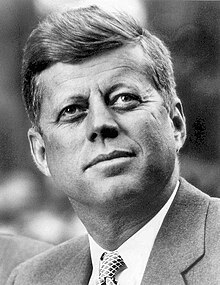President John Kennedy
| John F. Kennedy | |
|---|---|

John F. Kennedy in February 1961
|
|
| 35th President of the United States | |
|
In office January 20, 1961 – November 22, 1963 |
|
| Vice President | Lyndon B. Johnson |
| Preceded by | Dwight D. Eisenhower |
| Succeeded by | Lyndon B. Johnson |
|
United States Senator from Massachusetts |
|
|
In office January 3, 1953 – December 22, 1960 |
|
| Preceded by | Henry Cabot Lodge Jr. |
| Succeeded by | Benjamin A. Smith II |
| Member of the U.S. House of Representatives from Massachusetts's 11th district |
|
|
In office January 3, 1947 – January 3, 1953 |
|
| Preceded by | James Michael Curley |
| Succeeded by | Tip O'Neill |
| Personal details | |
| Born |
John Fitzgerald Kennedy May 29, 1917 Brookline, Massachusetts, U.S. |
| Died |
November 22, 1963 (aged 46) Dallas, Texas, U.S. |
| Cause of death | Assassination |
| Resting place | Arlington National Cemetery |
| Political party | Democratic |
| Spouse(s) | Jacqueline Lee Bouvier (m. 1953) |
| Relations | See Kennedy family |
| Children | Arabella Kennedy Caroline Bouvier Kennedy John Fitzgerald Kennedy Jr. Patrick Bouvier Kennedy |
| Parents | |
| Alma mater | Harvard University |
| Profession | Politician |
| Signature | |
| Military service | |
| Allegiance |
|
| Service/branch |
|
| Years of service | 1941–1945 |
| Rank |
|
| Unit |
|
| Battles/wars | |
| Awards | |
| The Kennedy Cabinet | ||
|---|---|---|
| Office | Name | Term |
| President | John F. Kennedy | 1961–1963 |
| Vice President | Lyndon B. Johnson | 1961–1963 |
| Secretary of State | Dean Rusk | 1961–1963 |
| Secretary of Treasury | C. Douglas Dillon | 1961–1963 |
| Secretary of Defense | Robert McNamara | 1961–1963 |
| Attorney General | Robert F. Kennedy | 1961–1963 |
| Postmaster General | J. Edward Day | 1961–1963 |
| John A. Gronouski | 1963 | |
| Secretary of the Interior | Stewart Udall | 1961–1963 |
| Secretary of Agriculture | Orville Freeman | 1961–1963 |
| Secretary of Commerce | Luther H. Hodges | 1961–1963 |
| Secretary of Labor | Arthur Goldberg | 1961–1962 |
| W. Willard Wirtz | 1962–1963 | |
| Secretary of Health, Education, and Welfare |
Abraham A. Ribicoff | 1961–1962 |
| Anthony J. Celebrezze | 1962–1963 | |
John Fitzgerald Kennedy (May 29, 1917 – November 22, 1963), commonly referred to by his initials JFK, was an American statesman who served as the 35th President of the United States from January 1961 until his assassination in November 1963. Kennedy served at the height of the Cold War, and much of his presidency focused on managing relations with the Soviet Union. He was a member of the Democratic Party who represented Massachusetts in the United States House of Representatives and the United States Senate prior to becoming president.
Kennedy was born in Brookline, Massachusetts, to Joseph P. Kennedy, Sr. and Rose Kennedy. A scion of the Kennedy family, he graduated from Harvard University in 1940 before joining the United States Naval Reserve the following year. During World War II, Kennedy commanded a series of PT boats in the Pacific theater and earned the Navy and Marine Corps Medal for his service. After the war, Kennedy represented Massachusetts's 11th congressional district in the United States House of Representatives from 1947 until 1953. He was subsequently elected to the U.S. Senate and served as the junior Senator from Massachusetts from 1953 until 1960. While serving in the Senate, he published Profiles in Courage, which won the Pulitzer Prize for Biography. In the 1960 presidential election, Kennedy narrowly defeated Republican opponent Richard Nixon, who was the incumbent Vice President.
...
Wikipedia
